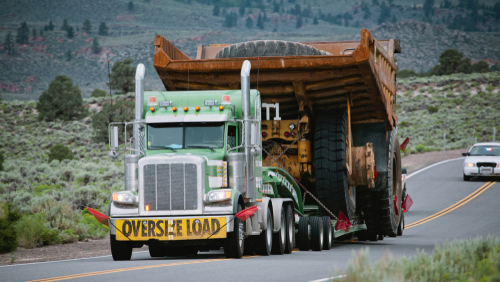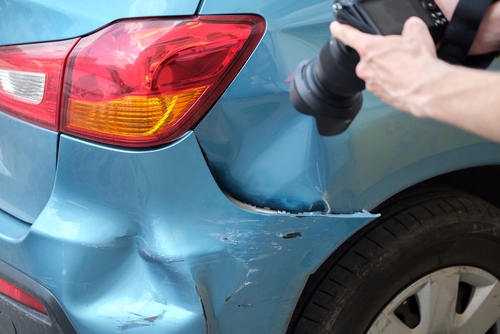Yes, road weight limits are enforced in Alberta, and a violation could be a significant factor in your injury claim. When a commercial truck is loaded beyond its legal limit, it changes how the vehicle brakes, steers, and responds in an emergency. An Edmonton truck accident lawyer can help prove the truck that hit you was overweight, providing powerful evidence that the trucking company’s carelessness contributed to your injuries.
However, establishing this connection isn’t always straightforward. It involves a detailed investigation into company logs, driver records, and the physics of the collision itself.
If you have questions about how a truck’s weight may have played a role in your accident, call MNH Injury Lawyers for a no-obligation consultation at (888) 664-5298.
Why Do Road Weight Limits Even Exist in Alberta?
It’s About More Than Just Protecting Pavement

Provincial regulations like the Commercial Vehicle Dimension and Weight Regulation (AR 315/2002) exist to manage the risks associated with heavy commercial vehicles. These laws are designed to create a balance between the economic needs of the transportation industry and the safety of everyone sharing the road.
How Excess Weight Makes a Truck More Dangerous
An overloaded truck is a danger to every other driver. The basic laws of physics dictate that more weight changes how a vehicle behaves, often with serious consequences.
- Longer Stopping Distances: A heavier truck requires a much longer distance to come to a complete stop. An extra few thousand kilograms of cargo could be the difference between a safe stop and a devastating rear-end collision.
- Brake and Tire Failure: Excess weight puts immense strain on a truck’s braking system and tires. This added stress increases the heat generated during braking, which leads to brake fade or catastrophic tire blowouts, causing a driver to lose control.
- Reduced Stability and Control: An overloaded or improperly loaded trailer raises a truck’s centre of gravity, making it top-heavy and difficult to control. This is especially dangerous during sudden manoeuvres, in high winds, or in poor weather conditions, increasing the risk of a rollover or jackknife accident.
What Are Seasonal Road Bans and Why Do They Matter?
You may have heard of “road bans” or “frost laws,” especially during the spring months in Alberta. These are a direct response to the physical changes our roads undergo every year.
During the annual spring thaw, the frozen ground beneath the pavement softens, making the road structure much more vulnerable to damage from heavy loads. To protect the integrity of the roads and ensure safety, both the provincial government and municipal jurisdictions like Strathcona County implement stricter weight restrictions. These seasonal road bans reduce allowable axle weights to 75% of the normal legal limit.
The timing of these bans is based on science. The province monitors frost and thaw depths using a network of about 70 frost probe stations across Alberta. When a trucking company ignores a posted road ban, it means it is operating a vehicle that is too heavy for what the road is able to safely support. A violation during a road ban period would be a clear indication that a company prioritized its delivery schedule over established safety regulations.
Connecting the Dots: How a Weight Violation Becomes Relevant in Your Injury Claim
It’s Not Automatic Fault, But It Is Powerful Evidence of Negligence
In a personal injury claim, our goal is to show that the other party was negligent. Simply put, negligence is a legal concept that means someone failed to act with reasonable care, and this failure was the cause of your injuries. A trucking company has a duty to ensure its vehicles are operated safely and in compliance with all traffic laws, including weight limits.
From a regulatory perspective, a weight limit violation is a form of strict liability for the trucking company. This means they could be fined by authorities, whether they intended to overload the truck or not. For your personal injury claim, that violation serves as powerful evidence that the company breached its duty to operate safely on public roads.
Building the Bridge: Proving Causation
Demonstrating that a weight violation occurred is the first step. The next, and equally important step, is to show how that specific failure, such as the excess weight, actually caused or contributed to the collision and your resulting injuries. This is known as causation, and it’s the bridge that connects the company’s rule-breaking to the harm you suffered.
- Example: If an overweight truck rear-ended your vehicle at a red light, we would argue that the excess weight extended its stopping distance, making it impossible for the driver to stop in time. This creates a direct link between the weight violation and the impact that caused your injuries.
- Example: If a commercial truck jackknifed on a highway curve and slid into your lane, we would investigate whether improper weight distribution made the vehicle dangerously unstable. The excess, poorly balanced load could be the very reason the driver lost control, again linking the violation to the collision.
Who Is Held Responsible? The Driver, The Company, or Both?
While the truck driver is in control of the vehicle, the responsibility extends far beyond the person behind the wheel. In most cases, the trucking company is legally responsible for the actions of its drivers while they are performing their job duties. This legal principle means the company can be held liable for its employee’s negligence, which is why you need a truck accident lawyer to investigate every party involved and pursue full compensation.
The investigation will dig deeper to see if the company’s own practices contributed to the overloading. Did they have policies that implicitly encouraged drivers to haul overweight loads to meet tight deadlines? Was there a failure to properly train drivers and loaders on weight limits and distribution? Or did the company simply look the other way, prioritizing profits over safety?
Because the company is typically held responsible, the claim is made against the company’s commercial insurance policy, which is specifically in place to cover these types of incidents.
How We Uncover the Truth: Finding Proof of an Overweight Truck After an Accident

After a serious collision, collecting evidence is usually not your first priority. You are focused on getting medical attention and starting your recovery at home, not collecting paperwork from the scene. This is where a legal team steps in to conduct a thorough investigation on your behalf, which shows why you need a lawyer to handle critical evidence and protect your rights.
The Document Trail We Pursue
A commercial truck generates a significant amount of paperwork for every trip. This document trail often holds the key to proving a truck was overloaded. We pursue a number of critical records:
- Police and Collision Reports: The investigating police officers, particularly those in commercial vehicle enforcement units, may have noted the truck’s load, inspected its logs, or even issued a citation for a weight violation at the scene.
- Driver’s Logbooks: These logs, which are now often electronic, detail the driver’s hours of service, routes, and stops. They contain important information about the cargo being transported.
- Bills of Lading and Shipping Receipts: These documents are like a recipe for the truck’s cargo. They provide a detailed list of every item being hauled and, crucially, its declared weight. Comparing this to the truck’s legal capacity could reveal an overload.
- Company Maintenance and Dispatch Records: These internal documents could sometimes reveal a pattern of poor vehicle maintenance or dispatch orders that pressured drivers to take on overweight loads.
- Weigh Scale Information: We can formally request records from any government or private weigh scales the truck may have passed on its route before the collision occurred.
Using Expert Analysis to Reconstruct the Event
In cases where the documentation is unclear or disputed, we may retain an accident reconstruction engineer. These are professionals with backgrounds in physics and engineering who are able to scientifically analyze the physical evidence of a crash. By examining vehicle damage, skid mark length and direction, and the final resting positions of the vehicles, they calculate critical factors like speed, force of impact, and, in some instances, the probable weight of the truck at the time of the collision. This detailed analysis highlights why you should contact a lawyer to secure and interpret this technical evidence effectively.
What About Special Permits and Exceptions?
The regulations surrounding commercial truck weights in Alberta are complex. It’s true that companies sometimes obtain special permits for loads that are oversized or overweight. This is often managed through a provincial system called TRAVIS (Transportation Routing and Vehicle Information System). Furthermore, certain industries, such as agriculture, may have specific exemptions that apply outside of the spring road ban season.
The existence of these permits and exceptions is precisely why a detailed investigation is so important. A company possessing a permit does not give them a free pass to operate recklessly. We would investigate to determine if a permit existed and if the company was complying with all the specific conditions attached to it.
Frequently Asked Questions About Road Weight Limits and Injury Claims
If a truck has a permit to be overweight, can the company still be found negligent?
Yes. A permit allows a truck to operate at a weight that is otherwise illegal, but it does not absolve the company of its fundamental duty to operate safely. If the oversized load was not properly secured, if the driver was not adequately trained to handle its unique characteristics, or if they failed to abide by the specific conditions of the permit, the company could still be found negligent if these actions led to an accident. How can a lawyer help in this situation? An attorney can investigate permit compliance, gather expert testimony, and prove how these failures contributed to your injuries.
What if my accident happened on a municipal road, not a major highway?
The rules are just as, if not more, important on municipal roads. Municipalities like the County of Minburn set their own road use rules and ban limits based on what their local infrastructure is able to safely handle. A weight violation on a smaller, local road which may have been designed for much lighter traffic, can be a very significant factor in a personal injury claim.
The police didn’t give the truck driver an overweight ticket at the scene. Does that mean I don’t have a case?
Not at all. A police officer arriving at the scene of a collision is managing many priorities at once, including securing the area, attending to injured parties, and directing traffic. They may not have the specialized equipment or the time to conduct a full commercial vehicle inspection and weight assessment. The absence of a ticket does not mean a weight violation did not occur. The conclusive evidence is often found later, within the company’s own documents and records that we obtain during our investigation.
How do the seasonal “road bans” for spring thaw specifically affect my claim?
Violating a seasonal road ban is a particularly clear breach of safety rules. These bans are well-publicized and exist for the explicit purpose of ensuring safety during a time when roads are structurally vulnerable. When a company ignores a road ban, it demonstrates a plain disregard for public safety regulations. This could make the argument for negligence even stronger in your claim, as it shows the company knowingly operated its vehicle under dangerous conditions.
What is a “Road Use Agreement,” and could it be relevant to my accident?
In many Alberta municipalities, companies that plan to haul a high volume of loads, such as more than five loaded trips to the same project, are required to enter into a Road Use Agreement with the local government. This agreement outlines their specific responsibilities for maintaining the roads they use heavily. If such an agreement was in place, it could establish an even higher standard of care that the company was contractually expected to meet, making any deviation from it a significant factor in your case.
Don’t Carry the Weight of Your Claim Alone

The connection between provincial road weight limits and your injury claim is complex, but it is a deciding factor in holding a negligent trucking company accountable. When a company chooses to ignore safety regulations that are designed to protect everyone on the road, they must answer for the harm that results.
Our team at MNH Injury Lawyers is prepared to handle these detailed investigations so you are able to focus on your recovery. If you were injured in an accident involving a commercial truck, contact us today for a free, no-obligation consultation. Let’s talk about what happened.
Call MNH Injury Lawyers at (888) 664-5298.
